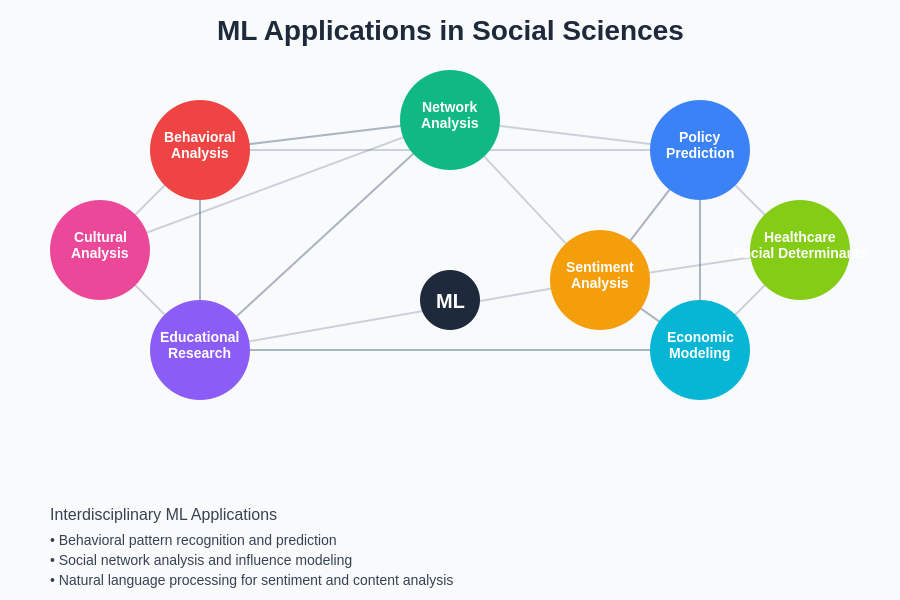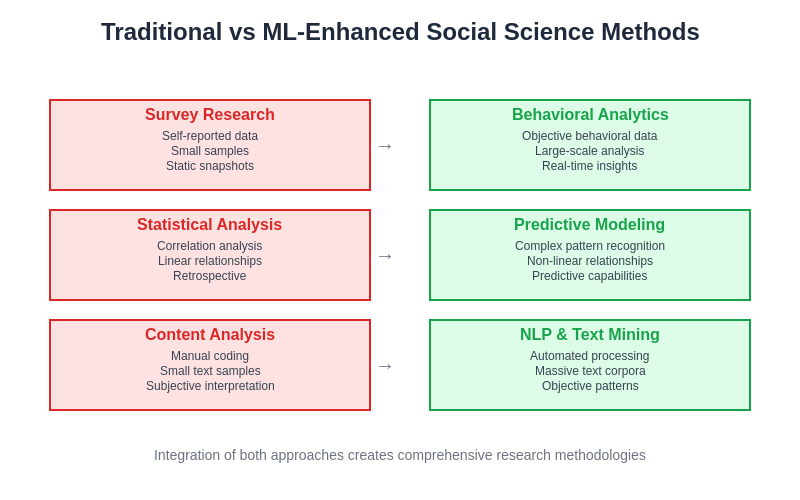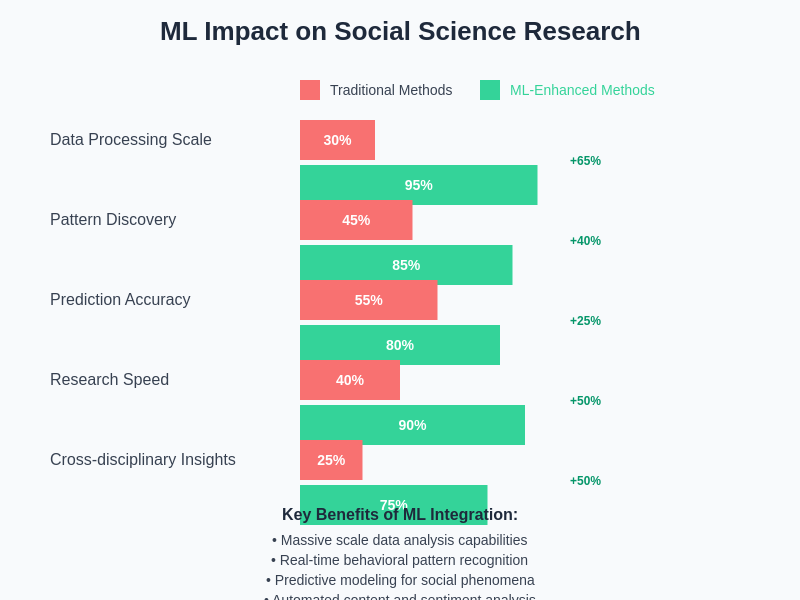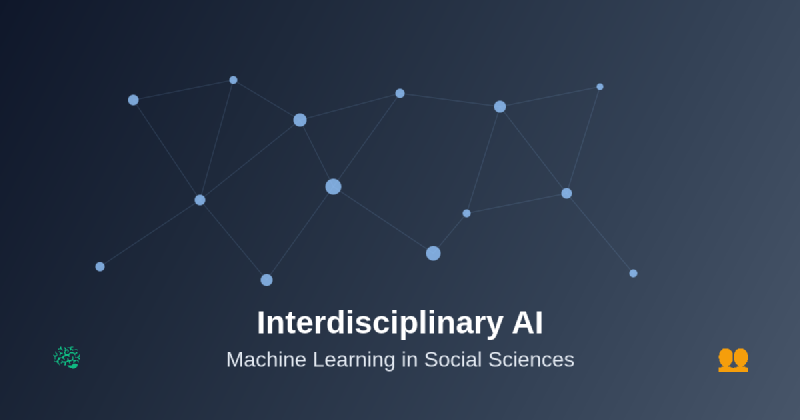The convergence of artificial intelligence and social sciences represents one of the most profound interdisciplinary collaborations of our time, fundamentally reshaping how researchers understand human behavior, social structures, and complex societal phenomena. Machine learning algorithms have transcended their traditional computational boundaries to become powerful analytical tools that illuminate patterns in human interactions, predict social trends, and provide unprecedented insights into the intricate mechanisms that govern our collective existence.
Explore the latest developments in AI research to understand how cutting-edge technologies are continuously expanding the frontiers of interdisciplinary research applications. The integration of machine learning methodologies into social science research has created entirely new research paradigms that combine the rigor of computational analysis with the nuanced understanding of human behavior that characterizes traditional social scientific inquiry.
The Evolution of Computational Social Science
The emergence of computational social science as a distinct field reflects the growing recognition that traditional qualitative and quantitative research methods, while valuable, are insufficient for addressing the complexity of modern social phenomena. Machine learning techniques have provided researchers with the capability to analyze vast datasets containing millions of social interactions, communication patterns, and behavioral indicators that were previously impossible to process using conventional statistical methods.
This transformation has been particularly pronounced in the analysis of social media data, where researchers can now examine real-time expressions of public opinion, emotional responses to social events, and the propagation of information across complex social networks. The ability to process and analyze this unprecedented volume of data has revealed new insights into collective behavior, social influence mechanisms, and the dynamics of opinion formation that were previously invisible to traditional research approaches.
The interdisciplinary nature of computational social science has also fostered collaboration between computer scientists, sociologists, psychologists, economists, and political scientists, creating research teams with diverse expertise that can tackle complex social problems from multiple perspectives simultaneously. This collaborative approach has proven essential for developing machine learning models that not only achieve high predictive accuracy but also provide meaningful interpretations that align with established social science theories and frameworks.
Behavioral Pattern Recognition and Analysis
Machine learning algorithms have revolutionized the study of human behavior by enabling researchers to identify subtle patterns and regularities in behavioral data that would be impossible to detect through manual analysis or traditional statistical methods. Advanced pattern recognition techniques can now analyze everything from consumer purchasing behaviors and social interaction patterns to learning behaviors and decision-making processes, providing unprecedented insights into the underlying mechanisms that drive human actions.
The application of unsupervised learning algorithms, particularly clustering and dimensionality reduction techniques, has proven especially valuable for discovering previously unknown behavioral categories and identifying hidden structures within complex behavioral datasets. These techniques have enabled researchers to move beyond predetermined theoretical categories and discover empirically-driven behavioral typologies that better reflect the actual diversity and complexity of human behavior in real-world contexts.
Harness the power of advanced AI tools like Claude for sophisticated data analysis and pattern recognition tasks that require nuanced understanding of complex behavioral and social phenomena. The combination of machine learning capabilities with expert social science knowledge creates powerful analytical frameworks that can uncover meaningful insights from vast amounts of behavioral data.
Predictive Modeling in Social Policy
One of the most impactful applications of machine learning in social sciences has been the development of predictive models for social policy analysis and intervention planning. These models can analyze historical data on social programs, demographic trends, and policy outcomes to predict the likely effects of proposed policy interventions, enabling policymakers to make more informed decisions about resource allocation and program design.
Predictive modeling has proven particularly valuable in areas such as criminal justice reform, where machine learning algorithms can analyze patterns in recidivism data, judicial decisions, and rehabilitation program outcomes to predict the effectiveness of different intervention strategies. Similarly, in education policy, machine learning models can analyze student performance data, demographic factors, and educational resource allocation patterns to predict which policy interventions are most likely to improve educational outcomes for different student populations.
The integration of machine learning into policy analysis has also enabled the development of dynamic models that can adapt and update their predictions as new data becomes available, providing policymakers with continuously updated assessments of policy effectiveness and recommendations for program adjustments. This real-time analytical capability has transformed policy implementation from a static, one-time decision process into a dynamic, data-driven optimization process that can respond quickly to changing social conditions and emerging challenges.
Network Analysis and Social Dynamics
The application of machine learning to social network analysis has provided researchers with powerful tools for understanding the complex relationships and influence patterns that shape social behavior and collective outcomes. Advanced graph neural networks and network embedding techniques can now analyze massive social networks to identify influential actors, predict information diffusion patterns, and understand the mechanisms through which social norms and behaviors spread through communities.
These analytical capabilities have proven particularly valuable for understanding phenomena such as the spread of misinformation, the formation of political polarization, and the emergence of social movements. Machine learning models can analyze the structural properties of social networks, the content of communications flowing through these networks, and the temporal dynamics of network evolution to provide comprehensive insights into how social influence operates in contemporary digital environments.
The ability to model and predict social network dynamics has also opened new possibilities for designing interventions that can leverage network effects to promote positive social outcomes. Researchers can now identify key network positions where targeted interventions are likely to have maximum impact, design communication strategies that optimize information diffusion through social networks, and predict how network structures might evolve in response to different policy interventions or social changes.
Sentiment Analysis and Public Opinion Research
Machine learning has transformed public opinion research by enabling real-time analysis of sentiment and opinion expression across vast digital platforms and communication channels. Natural language processing algorithms can now analyze millions of social media posts, news comments, survey responses, and other textual data sources to provide continuous monitoring of public sentiment on political issues, social policies, and cultural trends.
These sentiment analysis capabilities have proven particularly valuable for understanding rapid shifts in public opinion, identifying emerging social issues before they become widespread concerns, and tracking the effectiveness of public communication campaigns. The ability to analyze sentiment at scale and in real-time has provided researchers and policymakers with unprecedented insights into the dynamic nature of public opinion formation and the factors that influence collective sentiment changes.
Advanced sentiment analysis techniques can also identify nuanced emotional responses and opinion structures that go beyond simple positive/negative classifications, enabling researchers to understand the complex emotional landscape surrounding social issues and policy debates. This sophisticated emotional analysis has proven valuable for designing more effective public communication strategies and for understanding the psychological factors that drive political and social behavior.
Educational Research and Learning Analytics
The application of machine learning to educational research has created new opportunities for understanding learning processes, predicting student outcomes, and designing personalized educational interventions. Learning analytics platforms can now analyze detailed data on student interactions with educational materials, participation in online discussions, and performance on assessments to identify patterns that predict academic success and highlight students who may benefit from additional support.
Machine learning algorithms have proven particularly effective at identifying early warning signs of academic difficulty, enabling educational institutions to implement proactive interventions before students experience serious academic problems. These predictive capabilities have been especially valuable in online and blended learning environments, where traditional indicators of student engagement and academic progress may be less visible to instructors.
Leverage advanced research capabilities with Perplexity to access comprehensive information and analysis tools that support sophisticated educational research and learning analytics projects. The integration of multiple AI tools creates powerful research ecosystems that can address complex educational questions from multiple analytical perspectives.
Economic Behavior and Market Analysis
Machine learning applications in economic research have provided new insights into consumer behavior, market dynamics, and economic decision-making processes that complement traditional economic analysis methods. Advanced algorithms can now analyze high-frequency transaction data, consumer choice patterns, and market movements to identify behavioral factors that influence economic outcomes and predict market trends with unprecedented accuracy.
The analysis of economic behavior through machine learning has revealed important insights into phenomena such as behavioral biases in financial decision-making, the role of social influences in consumer choices, and the impact of information availability on market efficiency. These insights have important implications for economic policy design, financial regulation, and business strategy development.
Machine learning models have also proven valuable for analyzing the economic impacts of social policies and interventions, providing policymakers with quantitative tools for assessing the cost-effectiveness of different program options and predicting the economic consequences of policy changes. This analytical capability has enhanced the evidence base for economic policy decisions and improved the efficiency of resource allocation in social programs.
Healthcare and Social Determinants Research
The intersection of machine learning and social science research in healthcare has opened new avenues for understanding the social determinants of health and designing more effective public health interventions. Machine learning algorithms can analyze complex datasets that combine health outcomes, socioeconomic factors, environmental conditions, and behavioral patterns to identify the social factors that most strongly influence health disparities and disease outcomes.
These analytical capabilities have proven particularly valuable for understanding how social factors such as income inequality, educational attainment, social support networks, and community resources influence health outcomes across different populations. Machine learning models can identify complex interaction effects between social determinants that would be difficult to detect using traditional epidemiological methods, providing more nuanced understanding of how social conditions affect health.
The application of machine learning to social determinants research has also enabled the development of more targeted and effective public health interventions that address the root social causes of health disparities rather than just treating symptoms. This approach has proven particularly important for addressing chronic diseases, mental health conditions, and health disparities that are strongly influenced by social and environmental factors.
Cultural Analysis and Digital Humanities
Machine learning has transformed cultural analysis and digital humanities research by providing tools for analyzing vast archives of cultural artifacts, texts, and multimedia content that would be impossible to process using traditional analytical methods. Advanced natural language processing and computer vision algorithms can now analyze historical documents, literary works, artistic creations, and cultural expressions to identify patterns, themes, and evolutionary trends in cultural development.
These analytical capabilities have enabled researchers to conduct large-scale comparative studies of cultural phenomena across different time periods, geographic regions, and cultural contexts. Machine learning models can identify subtle patterns in cultural expression, track the evolution of ideas and concepts over time, and reveal previously hidden connections between different cultural movements and traditions.

The interconnected nature of machine learning applications across different social science disciplines demonstrates the truly interdisciplinary character of this technological integration. Each research area benefits from and contributes to advances in other domains, creating a synergistic ecosystem of methodological innovation and knowledge discovery.
The application of machine learning to cultural analysis has also opened new possibilities for preserving and analyzing endangered cultural heritage, enabling researchers to digitize and analyze cultural artifacts and practices that might otherwise be lost. This preservation and analysis work has important implications for understanding cultural diversity, protecting indigenous knowledge systems, and maintaining cultural continuity in rapidly changing societies.
Ethical Considerations and Responsible AI
The application of machine learning in social sciences raises important ethical considerations that require careful attention to issues of privacy, bias, fairness, and social impact. Researchers must navigate complex ethical challenges related to the use of personal data, the potential for algorithmic bias to perpetuate or amplify social inequalities, and the responsibility to ensure that research findings are used in ways that benefit rather than harm the communities being studied.
The development of ethical frameworks for AI in social science research has become a critical area of interdisciplinary collaboration, bringing together ethicists, social scientists, computer scientists, and policymakers to establish guidelines and best practices for responsible research conduct. These frameworks emphasize principles such as transparency, accountability, fairness, and social benefit as essential criteria for evaluating the appropriateness of machine learning applications in social research.
The ongoing evolution of ethical standards for AI in social sciences reflects the recognition that technological capabilities must be balanced with social responsibility and that the power of machine learning to influence social understanding and policy decisions requires careful stewardship to ensure positive social outcomes.
Methodological Innovation and Research Design
The integration of machine learning into social science research has driven significant methodological innovations that are reshaping how researchers design studies, collect data, and draw conclusions from their analyses. Mixed-methods approaches that combine machine learning techniques with traditional qualitative and quantitative methods have emerged as particularly powerful frameworks for addressing complex social research questions that require both computational analysis and interpretive understanding.
These methodological innovations have also led to new approaches to research validation and replication, as researchers develop techniques for assessing the reliability and generalizability of machine learning findings across different contexts and populations. The development of robust validation frameworks has become essential for ensuring that machine learning applications in social sciences meet the rigorous standards of scientific inquiry that characterize the field.

The evolution from traditional social science methods to machine learning-enhanced approaches represents a fundamental shift in research capabilities while maintaining the core principles of rigorous scientific inquiry. This methodological transformation enables researchers to address questions and analyze phenomena that were previously beyond the scope of empirical investigation.
The evolution of research methodologies has also emphasized the importance of interdisciplinary collaboration and the need for social scientists to develop computational skills while maintaining their disciplinary expertise. This skill development has led to new educational programs and training initiatives that prepare researchers to work effectively at the intersection of social science and machine learning.
Future Directions and Emerging Applications
The future of machine learning in social sciences promises continued expansion into new research areas and the development of increasingly sophisticated analytical techniques that can address complex social phenomena with greater precision and insight. Emerging applications include the use of machine learning for analyzing climate change impacts on social systems, understanding the social dimensions of technological adoption, and predicting the social consequences of demographic transitions.
The development of more advanced machine learning techniques, including large language models, multimodal analysis capabilities, and causal inference methods, will continue to expand the analytical possibilities for social science research. These technological advances will enable researchers to tackle increasingly complex questions about human behavior, social organization, and collective outcomes that were previously beyond the scope of empirical investigation.
The continued evolution of machine learning applications in social sciences will also require ongoing attention to ethical considerations, methodological rigor, and the integration of computational approaches with established social science theories and frameworks. The future success of this interdisciplinary collaboration will depend on the ability of researchers to maintain the humanistic values and social concerns that define social science while leveraging the analytical power of machine learning to generate new insights and understanding.

The measurable impact of machine learning integration across various dimensions of social science research demonstrates the transformative potential of this technological adoption. These improvements in research capabilities, efficiency, and insight generation are driving continued investment in interdisciplinary collaboration and methodological innovation.
The transformative potential of machine learning in social sciences extends beyond academic research to influence policy development, social intervention design, and our fundamental understanding of human society. As these technologies continue to evolve and mature, they will play an increasingly important role in addressing the complex social challenges of the 21st century and in building more equitable, sustainable, and thriving human communities.
Disclaimer
This article is for informational purposes only and does not constitute professional advice. The views expressed are based on current understanding of machine learning applications in social sciences and their potential impacts on research methodologies and social understanding. Readers should conduct their own research and consider ethical implications when implementing AI technologies in social science research. The effectiveness and appropriateness of machine learning applications may vary depending on specific research contexts, populations studied, and institutional requirements.
